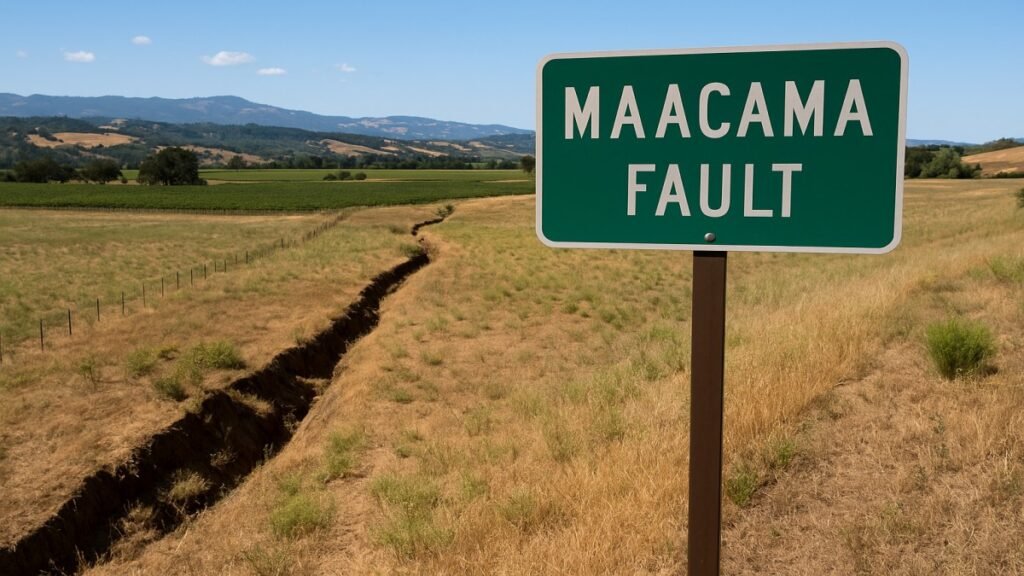Introduction
You’ve probably heard of the infamous San Andreas Fault, but have you ever come across the Maacama Fault? Tucked into Northern California’s complex tectonic landscape, this lesser-known fault could play a huge role in the region’s seismic future. While it may not get the same headlines, understanding the Maacama Fault is critical—especially if you live anywhere near it.
Geological Background
Location and Overview
The Maacama Fault runs through parts of Sonoma, Mendocino, and Lake Counties in Northern California. It extends roughly 140 kilometers (about 87 miles) from Healdsburg up past Willits and beyond. It closely follows Highway 101 in many places—yes, right beneath your tires!
Relationship to the San Andreas Fault System
Here’s the deal: the Maacama Fault isn’t just some rogue crack in the Earth. It’s part of the larger San Andreas Fault system, which means it plays a role in the boundary between the Pacific and North American tectonic plates. It’s like the quieter sibling of the San Andreas—less flashy, but still packing a punch.
Tectonic Setting
California sits on a dynamic plate boundary. The Maacama Fault is a right-lateral (strike-slip) fault, meaning the two sides slide past each other horizontally. If you stood on one side of the fault and looked across during a quake, the other side would appear to move to the right.
Physical Characteristics
Length and Direction
Stretching roughly northwest-southeast, the Maacama Fault carves its path through valleys, towns, and rural landscapes. Its orientation and depth make it a crucial release point for crustal tension in this active region.
Type of Fault Movement
As a strike-slip fault, Maacama’s movement is horizontal, similar to the better-known San Andreas. This type of fault is known for sudden jolts that can cause serious structural damage—especially in unprepared areas.
Notable Surface Features
You’ll find signs of the Maacama Fault if you know where to look. Offset fences, tilted telephone poles, and small ground ruptures have all been observed in areas like Willits. These subtle hints whisper warnings about what’s lurking below.
Earthquake Potential
Historical Seismic Activity
While it hasn’t released a massive quake in recent memory, the Maacama Fault has definitely shown signs of life. Small to moderate tremors have occurred along its length, and geological studies reveal it’s capable of much more.
Recurrence Interval
Experts estimate the Maacama Fault has a recurrence interval of 200–300 years for significant quakes. That might sound like a long time, but considering the last major one occurred centuries ago, the clock is ticking.
Potential Magnitude of Future Quakes
Models suggest the Maacama Fault could generate an earthquake in the magnitude 6.5 to 7.2 range. In densely populated regions like Northern California, that’s no small shake. Buildings, bridges, and roads in its path could be at risk.
Impact Zones
Areas at Risk
Towns like Healdsburg, Ukiah, and Willits lie directly along or near the Maacama Fault line. Many of these towns have historic buildings and older infrastructure that might not be up to modern seismic codes.
Population and Infrastructure Concerns
The growing population in these counties makes the threat even more pressing. Hospitals, schools, and utilities could all be affected by a significant seismic event. Emergency response could be complicated by damaged roads or bridges.
Conclusion
The Maacama Fault may not make the evening news, but it’s a sleeping giant that deserves our attention. From the North Bay to the Mendocino hills, the ground beneath us is shifting—and knowledge is our best defense. The more we understand, the better we can prepare. Because when the Earth decides to move, it won’t send a calendar invite.
FAQ
1. Is the Maacama Fault active?
Yes, it is considered active and continues to show signs of movement and seismic potential.
2. How often do earthquakes happen along the Maacama Fault?
Small tremors occur frequently, while major quakes may happen every 200–300 years.
3. Can the Maacama Fault cause a major earthquake?
Yes, it could produce an earthquake of magnitude 6.5–7.2, which would have serious local impacts.
4. What towns lie directly on the Maacama Fault?
Healdsburg, Ukiah, and Willits are among the towns closest to the fault line.
5. How can I prepare if I live near the Maacama Fault?
Secure your home, participate in earthquake drills, and stay informed through local emergency management services.








